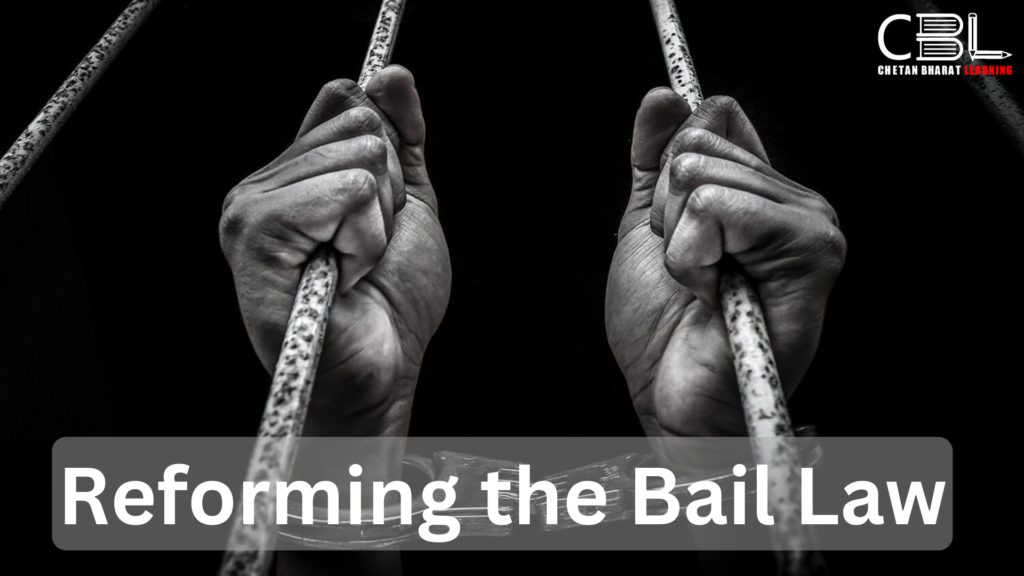Important for
Prelims: Polity
Mains: General Studies II

- The Bail Law: The Supreme Court underlined that ‘there is a pressing need’ for reform in the bail law related. It stressed the government to consider a special legislation on the lines of the bail law in the United Kingdom.
- Bail is a significant aspect of the criminal justice system in India, allowing an accused person to be released from custody under certain conditions.
Types of Bail:
- Regular Bail: Granted to a person who has already been arrested and kept in police custody.
- The person can apply for bail under Section 437 and 439 of the CrPC.
- Interim Bail: A temporary bail granted for a short period before the hearing for the grant of regular or anticipatory bail.
- Anticipatory Bail: Section 438 of the CrPC grants anticipatory bail. it is a direction to release a person on bail, even before the person’s arrest.
Current Bail Laws in India:
- The Code of Criminal Procedure, 1973 (CrPC) governs the terms of bail in India.
- However, It does not explicitly define ‘bail’. But it does define the terms ‘bailable offence’ and ‘non-bailable offence’ under Section 2(a).
- Additionally, the Supreme Court has noted that the current bail laws have led to overcrowded jails and hasty arrests.
Key Changes in BNSS from CrPC:
- Police Custody: The BNSS allows up to 15 days of police custody. This can be authorised in parts during the initial 40 or 60 days of the 60 or 90 days period of judicial custody. It may lead to denial of bail for the entire period if the police have not exhausted the 15 days custody.
- Multiple Charges: The CrPC provides for bail for an accused who has been detained for half the maximum imprisonment for the offence.
- But, the BNSS denies this facility for anyone facing multiple charges. As many cases involve charges under multiple sections, this may limit such bail.
- Relaxed Punishment: First-time offender to be given relaxed punishment (one-fourth and one-sixth of such punishment) in plea bargaining.
Need for Reform
- Satender Kumar Antil vs CBI (2022), highlighted the flaws in the bail system. It urged the government to consider introducing a legislation in the nature of a Bail Act to streamline the grant of bail.
- In this, Apex court also highlighted the dire situation of jails and spoke of overcrowding of undertrial prisoners, indiscriminate arrests, etc.
- Overcrowding in Prisons: Over 75% undertrials
Presumption of Innocence:
- There is breach of the principle that ‘bail not jail’ should be the norm.
Proposed Changes inline with the UK
- Bail Act of the United Kingdom (1976) recognises bail as a ‘general right’ and focuses on reducing overcrowding of undertrial inmates in prisons.
- its aim to reduce the size of the inmate population.
- It makes provision for legal aid limited to questions of bail in certain cases. And for legal aid for persons kept in custody for inquiries or reports. Its Section 4(1) raises the presumption of bai. It states that the law applies to bail granted person except as provided in Schedule 1 to the Act.
Conclusion
- The call for bail law reform in India is a significant step towards ensuring justice and upholding the rights of the accused.
It is hoped that the government will consider the introduction of a separate enactment to streamline the grant of bails. - The proposed reforms aim to strike a balance between the individual’s right to freedom and the interest of society.
Practice Questions for Prelims
Consider the following statements regarding Bail in Indian judicial system :
1. Code of Criminal Procedure, 1973 (CrPC) does not explicitly define ‘bail’ but it does define the terms ‘bailable offence’ and ‘non-bailable offence’.
2. The BNSS allows up to 15 days of police custody, which can be authorised in parts.
Which of the statements given above is / are correct :
a) 1 only
b) 2 only
c) Both 1 and 2
d) Neither 1 nor 2
Ans. c)




Leave a Reply
You must be logged in to post a comment.